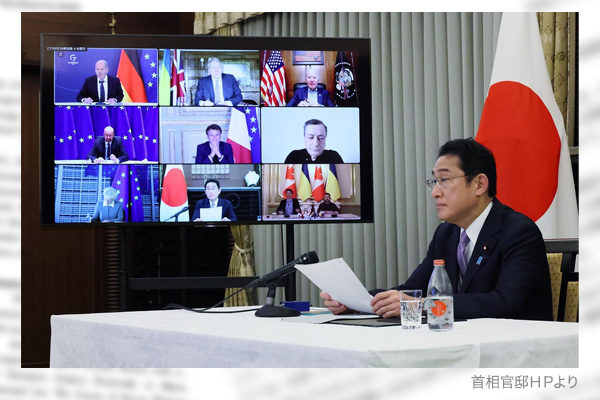The Group of Seven industrial democracies agreed in principle on an embargo on Russian oil at their virtual summit on May 8. Japan has decided that it has no choice but to give priority to the G7 unity. Japan must naturally be prepared to see a backlash that always accompanies economic sanctions. It is important to coolly determine whether or not damage to the sanction target is greater than to the sanction imposer.
Oil embargo as a tough option
Energy security must be viewed from multiple angles.
It is unwise to conclude that Japan would suffer less from the embargo as it depends on Russia only for 3.6% of its oil supply against 37% for the European Union. Japan features an extremely low energy self-sufficiency rate among industrial countries at 12%, depending on imports for almost all its oil supply. As indicated by a warning about a tight electricity supply-demand balance for eastern Japan in March, Japan’s electricity supply is on a tightrope. Japan is expected to see critical electricity situations again this summer and next winter.
It may also not be easy to make up for a loss on the Russian oil embargo. Saudi Arabia and other Middle Eastern oil-producing countries have room to increase production, but are cautious of the increase, giving priority to their unity with Russia.
However, Japan has made a tough decision to go along if the EU goes to a Russian oil embargo. The United States, unlike the EU and Japan, would feel little pain from the embargo as it is an oil exporter. The EU is not necessarily united on the embargo. While the EU president and the European Commission president are eager to support the embargo, the EU has yet to reach full agreement on the matter in the face of opposition from some members.
Meanwhile, the Russian energy industry is likely to decline as its production and transportation have been seriously affected by Western economic sanctions. First, its production capacity will surely dwindle in the absence of spare parts supplies to maintain oil and gas production. If international oil majors that have knowhow for operating oil projects withdraw from Russia, it may be difficult for Russia to depend on China for covering the loss. As for transportation, shipping insurance premiums for Russian oil have spiked. Western countries are considering a ban on insurance for ships that carry Russian oil. Tanker shipments from the Sakhalin 1 oil development project in the Russian Far East have virtually come to a halt.
In consideration of such realities, the Japanese government apparently has decided to give priority to the G7 unity and agreed in principle to the Russian oil embargo.
Retaining interests in Sakhalin does not contradict the oil embargo
Japanese Prime Minister Fumio Kishida has sustained a policy of retaining Japanese interests in the Sakhalin 1 oil development project and the Sakhalin 2 natural gas project. As I pointed out in my Speaking Out column under the title “Japan should not withdraw from Sakhalin projects” on March 14, this policy is appropriate. The possession of interests or stakes in the Russian oil project should be separated from oil purchases. French oil major Total vowed to halt oil procurement from Russia while retaining its existing interests in Russian projects, keeping step with Japan. Total explained that its withdrawal from Russian projects would benefit Russian investors to the disadvantage of the sanctions as its stakes abandoned by Total may be sold to China at higher prices.
As a matter of course, it is important to cut off funding for Russian war efforts. But Japan should consider that it features the most vulnerable energy security among the G7 countries, being put into conditions that differ far from those for Europe and the United States. Japan should make a cool judgement after considering multidirectionally whether it can tolerate any backlash from sanctions.
Masahiko Hosokawa is a professor at Meisei University and a former director-general of the Trade Control Department at Japan’s Ministry of Economy, Trade and Industry. He is also a Planning Committee member at the Japan Institute for National Fundamentals.


